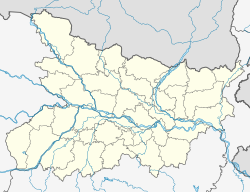Rosera
|
Rosera रोसड़ा |
|
|---|---|
| Town | |
| Nickname(s): Rosera, Rusera, Rusera Ghat | |
| Location in Bihar, India | |
| Coordinates: 25°46′N 86°02′E / 25.76°N 86.03°ECoordinates: 25°46′N 86°02′E / 25.76°N 86.03°E | |
| Country |
|
| State | Bihar |
| District | Samastipur |
| Time zone | IST (UTC+5:30) |
| PIN | 848210 |
| Telephone code | 06275 |
Rosera is a town (subdivision) at the bank of River Budhi Gandak. It is a municipality in Samastipur district in the Indian state of Bihar.
As per 2011 India census, Rosera had a population of 31,155 [2011]. Males constituted 53% of the population and females 47%. Rosera had an average literacy rate of 64.5%: male literacy was 70%, and female literacy 58%. 16% of the population were under 6 years of age.
Rosera is a trading centre due to its location, situated on the trade route of the river Budhi Gandak. Rosera is an active business hub for lychee, jewellery, carpets, clothing, medicine and agriculture. As the birthplace of Krishna Karak (founder of bachchan vansi acharya gadi of Kabir Panth), Rosera became a place of pilgrimage for Kabirpanthis.
Rosera with multiple rivers flowing through, is rich in agriculture because of its fertile plain. Tobacco, maize, rice and wheat are the main crops. Leechi and mango fruits are grown in abundance. Sugarcanes are also produced here and sent to Hasanpur chini mill for processing.
Rosera was famous for wooden kamadals used by Hindu sages for keeping water, though the art vanished with the death of the carpenter Jangal Mistree and Gulten Mistree.
Rosera has been a great hub for spices in the past due to its location near the tributary of River Gandak. In modern times, along with flour mills, Rosera has a numerous number of cloth shops. Many branded showrooms are also being set up, making it more urbanized. The main market of Rosera is the Mahavir Chowk on the Station Road, and a jewellery market from Mahavir Chok to Purani Chok has many jewellery shops.
Rosera celebrates many festivals during the year. One of the main festivals celebrated there is Chhath, five days after Deepawali. Makar Sankranti (Kichdi) is celebrated on 14 January, Saraswati Puja (with grand statues), Holi of Bhirha Paschim (all colourful), Ram Navami, Raksha Bandhan (between brothers and sisters), Durga Puja, Diwali and Chhath.
...
Wikipedia

